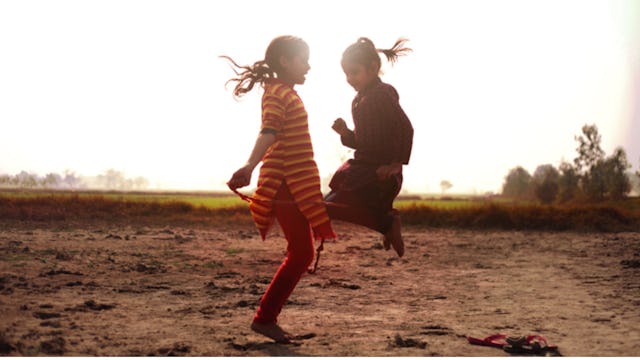I Grew Up Poor, And This Is What I Learned

For a large part of my childhood, I lived in a single-wide trailer where I shared a room and a bed with my little sister. My mother was the queen of consignment shopping and coupon clipping. When it came to saving money at the checkout stand, she was the master. Hand-me-downs were the norm, and spontaneous toy purchases weren’t a thing.
Though our small trailer kept us warm and dry, it wasn’t the sturdiest structure. A path of weathered plywood covered the muddy patches that led to our front door, which could be easily opened with a flathead screwdriver should you forget your key.
When you’re poor, you know better than to ask for things like fireworks on the Fourth of July or trips to the pumpkin patch in the fall. Purchases are limited to things that are essential, like the gas and light bill. Your clothes are never trendy, and rarely new. Sometimes they are handmade. Oatmeal, peanut butter sandwiches, and cereal are eaten for breakfast, lunch and dinner, and you don’t eat out unless it’s a special occasion.
My family didn’t have rural water, or a well, so each week we drove to town with a large water tank and fed quarters into the machine at the water house until the tank was full. We emptied the water into a cistern back at home. When the cistern ran dry, we were out of water and the process started all over again. At times there wasn’t enough water to do laundry or shower. Water conservation was a constant concern.
But growing up poor isn’t all bad. In fact, over time, I’ve learned to see some of the things growing up poor taught me. If we’re talking in terms of silver spoons, kids who grow up poor are grateful just to have a plastic spork. I appreciate everything I have and the hard work it took to get it. My expectations are often exceeded, because my bar for acceptable is typically lower than most. I don’t require fancy things to be happy, and I value the safety and health of my family above all else.
When things go wrong, you learn to just roll with it. You don’t take life too seriously, and you laugh a lot. I credit some of the strangest moments of my youth for my ability to find humor in the oddest circumstances—like when I was nine and an opossum got into the air ducts under the trailer. We heard it scurrying around before it pushed the vent from the floor and sprung out like the world’s freakiest jack-in-the-box. When an oversized forest rat forces entry into your living room, you really only have a few options: you can scream, maybe contact a therapist, or you can laugh. We couldn’t afford therapy, so my family laughed a lot—we still do.
Strength and resilience are another fortunate byproduct of growing up poor. When things don’t come easy, you learn to push harder and find alternate paths. People tend not to expect much from the kids in the trailer park, which can make the path more daunting. We learn to push back, to keep moving. For those of us that made it out, I assure you it wasn’t easy.
I read somewhere that attitude is the difference between an ordeal and an adventure, and it couldn’t be more true. Some of my greatest qualities are because I chose to view our circumstances as an adventure. I remember sitting on the bed I shared with my sister, thick sheets of plastic covered our bedroom windows to keep the draft out. On windy days, the plastic would fill with air and billow inward like the sails of a boat. We imagined we were pirates, sailing on the high seas, fighting sea monsters and searching for treasure. I wielded a fly-swatter like a sword, shouting words only pirates should say. Those memories are magical, and remind me how far I’ve come.
Little about my childhood was easy, but I’ve come away from it a stronger woman than I might have been if things were different. Growing up poor made me who I am today, and for that, I’m grateful.
This article was originally published on